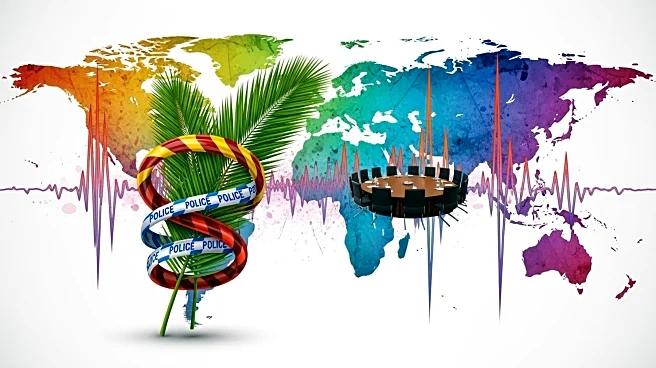What's Happening?
Reggaeton, a genre that originated in Puerto Rico in the late 1990s, has become a global musical phenomenon. Initially a fusion of Jamaican dancehall, hip-hop, and Latin American music, reggaeton was coined
by DJ Nelson to better reflect its diverse influences. The genre quickly gained popularity in Puerto Rico and spread throughout Latin America, the United States, and Europe. Reggaeton is characterized by its fast-paced beats and lyrics often focusing on themes of love, sex, and partying. Despite facing criticism for its explicit content, reggaeton has been praised for its cultural fusion and ability to bring together diverse communities.
Why It's Important?
The rise of reggaeton highlights the power of music as a cultural bridge, transcending geographical and linguistic barriers. Its global spread has been facilitated by social media and streaming platforms, allowing artists to reach international audiences. Reggaeton's influence extends beyond music, impacting fashion and lifestyle, with major brands creating collections inspired by the genre. The genre's success underscores the growing influence of Latin music in the global music industry, providing opportunities for artists from diverse backgrounds to gain international recognition.
What's Next?
As reggaeton continues to evolve, it is expected to gain further popularity worldwide. The genre is expanding to include elements from other musical styles, leading to the creation of new subgenres. With the increasing interest in Latin music in countries like India, China, and Japan, reggaeton is poised to reach new markets. The genre's future looks promising as more producers and DJs enter the scene, contributing to its growth and evolution.
Beyond the Headlines
Reggaeton's journey from an underground movement to a mainstream genre reflects broader cultural shifts and the increasing acceptance of diverse musical influences. The genre's ability to adapt and incorporate new elements has been key to its longevity and appeal. As reggaeton continues to grow, it may inspire other genres to embrace cultural fusion, leading to a more interconnected global music landscape.











